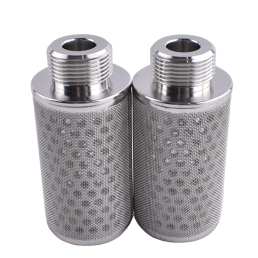The Industrial Workhorse Redefining Filtration Efficiency in 2025
Metal Mesh Filters—Why They’re the Future of Industrial Filtration
In industries where contamination control, process reliability, and operational costs are non-negotiable, filtration isn’t just a step—it’s a critical investment. Traditional filters (e.g., fiberglass, polypropylene) often falter under extreme conditions: they degrade in high heat, corrode in chemically harsh environments, and require frequent replacement, driving up downtime and labor costs. Enter metal mesh filters—a robust, adaptable alternative that’s reshaping how manufacturers approach filtration.

1. Why Metal Mesh Filters Outperform Traditional Options
Metal mesh filters (typically crafted from 304/316L stainless steel, nickel alloys, or titanium) leverage the inherent strengths of metals to solve the limitations of conventional materials:
-
Extreme Durability: Unlike fabric or paper filters, metal mesh withstands temperatures up to 1200°C (2192°F) and resists corrosion from acids, alkalis, and saltwater. A 2023 study by Industrial Filtration Journal found that metal mesh filters last 3–5x longer than polypropylene alternatives in chemical processing plants, reducing annual replacement costs by 40–60%.
-
Superior Precision & Flow: Metal mesh can be woven into intricate patterns (e.g., plain weave, twill weave) to achieve precise particle capture—from 1μm (micron) for pharmaceuticals to 50μm for heavy-duty industrial applications. This balance of precision and permeability ensures high flow rates (up to 30% faster than fabric filters) while maintaining efficiency.
-
Reusability & Sustainability: Most metal mesh filters are designed for clean-in-place (CIP) or high-pressure backwashing, allowing repeated use without compromising performance. A food processing facility in Germany reported reusing a single metal mesh filter for 18 months (vs. 2–3 months for disposable filters), cutting waste by 12 tons annually.
2. Key Applications: Where Metal Mesh Shines
Metal mesh filters aren’t one-size-fits-all—they’re engineered for niche industrial challenges:
-
High-Temperature Environments: In steel mills, metal mesh filters trap molten metal splatter and abrasive dust in blast furnaces, where temperatures exceed 1000°C. A U.S. steel manufacturer replaced ceramic filters with 310S stainless steel mesh, reducing maintenance stops by 50% and extending filter life from 6 months to 2 years.
-
Corrosive Chemical Processing: For refineries handling sulfuric acid or chlorine gas, nickel-alloy mesh (e.g., Hastelloy®) resists pitting and oxidation. A chemical plant in Texas reported zero filter failures in 12 months after switching from fiberglass, avoiding $250k in unplanned downtime costs.
-
Food & Pharma Purity: Stainless steel mesh (316L grade, FDA-compliant) meets strict hygiene standards, making it ideal for filtering beverages, pharmaceuticals, and edible oils. A dairy cooperative in France uses mesh filters to remove bacteria and debris from milk, improving product shelf life by 15%.
3. How to Choose the Right Metal Mesh Filter for Your Operation
Selecting the optimal system requires balancing three factors:
-
Material Grade: Match the metal to your environment. For acidic conditions, 316L stainless steel (with molybdenum) is ideal; for high heat, Inconel® or titanium alloys are better.
-
Mesh Specifications: Mesh count (e.g., 100 mesh = 150μm openings) dictates particle capture size. Use a mesh calculator (many suppliers offer free tools) to align with your target contaminant size.
-
Custom Engineering: Off-the-shelf filters often fail in unique setups. Look for suppliers that offer custom shapes (e.g., conical, cylindrical), layering (multi-layer mesh for depth filtration), or coating (e.g., PTFE for anti-stick properties).
4. Data-Driven Results: Real-World Success Stories
- Case 1: A lithium-ion battery manufacturer in Norway faced contamination issues during cathode material production. Switching to 316L stainless steel mesh (200-mesh) reduced metal particle contamination by 99.8%, boosting battery efficiency by 3%.
- Case 2: An Australian winery struggled with clogging in its juice clarification process. A custom stainless steel mesh filter (120-mesh) cut cleaning frequency from daily to weekly, saving 15 hours of labor monthly.


